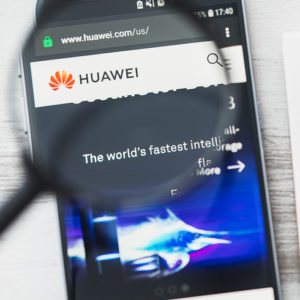Who knew Rudy Giuliani was psychic?
The evidence is clear. In August 2018, he argued on American television that “Truth isn’t truth.” Earlier that same year, in response to an interviewer’s assertion that “facts are not in the eye of the beholder,” Giuliani said, “Nowadays, they are.”
At the time, President Donald Trump’s lawyer was arguing why his client should not testify before a committee investigating possible presidential malfeasance. But Mr. Giuliani could just as easily have been discussing U.S. media coverage of Huawei to date.
Huawei is a privately held company, owned by the people who work there.
Huawei networking products have been repeatedly, independently tested for backdoors and other security risks. Those products have been found to be safe enough to be deployed in networks around the world, networks managed by trusted telecom operators overseen by local governments.
In more than 30 years, Huawei technologies have never been proven to have caused any major network security breaches.
Huawei has worked closely with government cybersecurity experts around the world to maintain this track record. Company leadership has even offered to sign contracts guaranteeing the safety of its offerings.
Huawei founder and CEO, Ren Zhengfei, has gone so far as to offer to license the company’s 5G networking technology to an American buyer. Such a move would alleviate concerns over undue influence or access by, variously, the Chinese government, the Chinese military — or both. It would also enable U.S. corporate participation in the telecom marketplace.
Yet, if one consumed only a steady diet of most mainstream U.S. reporting about the company, one might never know any of these facts. Instead, many in the U.S. media continue to regurgitate frequently unrebutted, baseless accusations and inaccuracies uttered by politicians, government officials and those who profit by currying favor with them.
All of this is in sharp contrast to the 1970s and 1980s, when the U.S. government engaged in “normal trade relations” with China. Throughout that period, the U.S. actively sought to influence China’s activities in areas ranging from intellectual property to human rights. And China became one of America’s top trading partners, which it still is today.
So, how did we get where we are now, where there is no U.S. manufacturer of telecom equipment?
In large part, by American companies forfeiting their leadership in networking technologies during the 1990s and early 2000s, in favor of short-term increases in revenues, profit and returns to shareholders. Once-mighty bastions of innovation such as AT&T Labs sold off their basic research and development resources to companies such as Canada’s Northern Telecom and France’s Alcatel.
Eventually, even those companies succumbed to financial pressures and strategic missteps, leaving the door open for companies such as Finland’s Nokia and Sweden’s Ericsson —along with China’s Huawei — to take the lead in advanced networking. Huawei, Ericsson and Nokia are now the dominant players in the market for so-called 5G wireless networking, which is poised to revolutionize how people and businesses communicate around the world.
Meanwhile, America’s government has shifted focus, from innovation to legislation. The 2019 National Defense Authorization Act (NDAA), referred to by some as the “Anti-Huawei Act,” limited use of Huawei products by U.S. federal agencies. The 2020 NDAA, signed by President Trump, bans the U.S. Commerce Department from removing Huawei from the agency’s “entity list” without proof the company is no longer a national security threat (https://thehill.com/policy/cybersecurity/478197-senators-offer-bill-to-create-alternatives-to-huawei-in-5g-tech).
American government officials have repeatedly called Huawei a threat to national security, despite no clear evidence to support that charge. In January 2020, American representatives presented counterparts in the United Kingdom with a supposedly “incendiary dossier” (https://www.theguardian.com/technology/2020/jan/13/using-huawei-in-uk-5g-networks-would-be-madness-us-says) of risks associated with Huawei and its products. However, the British Broadcasting Company (BBC) reported that the dossier contained no “smoking gun,” and little if any new information of value (https://www.bbc.com/news/technology-51112232).
Countries, companies and governments have repeatedly put Huawei and its offerings to the test. They have come away satisfied they could do business with the company safely. Experts ranging from Microsoft founder Bill Gates to Harvard University economist Jeffrey Sachs have said publicly that attempting to ban Huawei from doing business in the United States is wrong and dangerously disruptive to global supply chains.
It is also dangerously disruptive to American companies, their employees and their families. Huawei had been purchasing more than $11 billion worth of technology from U.S. companies annually. By shutting off that revenue stream, American politicians have put tens of thousands of U.S. jobs at risk.
Every time it misreports or ignores the facts about Huawei, the U.S. media does a grave disservice to those who consume it, and to its legacy of superior investigative journalism.
Throughout 2020, Huawei will intensify its efforts to fight misinformation with facts, at its Huawei Facts website (https://www.huawei.com/en/facts), on social media and elsewhere. Huawei will also tell more stories about its people, its history, and its focus on delivering technologies and solutions that connect, not divide. Because we are all stronger together. And together, we can prove Rudy Giuliani — and those propagating “alternative facts” about Huawei — wrong and irrelevant.

